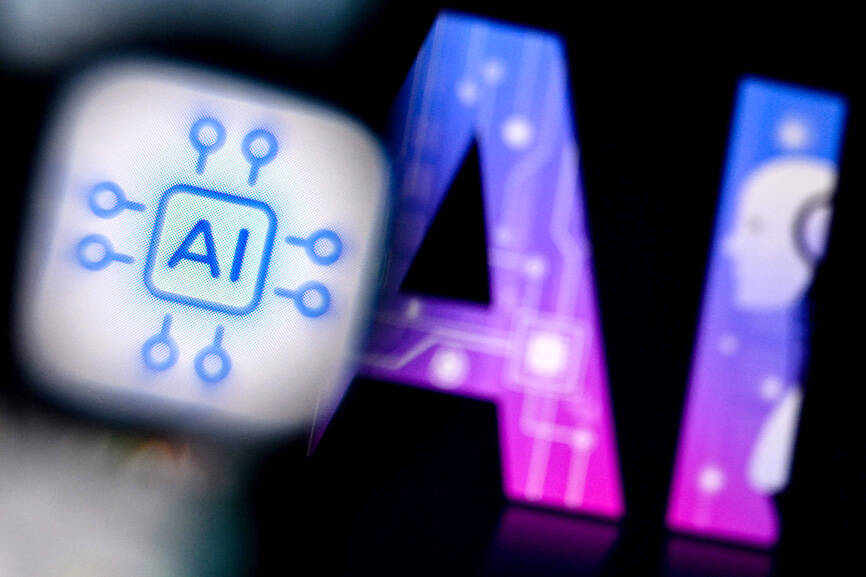Conversational artificial intelligence (AI) tools might soon “covertly influence” users’ decision making in a new commercial frontier called the “intention economy,” University of Cambridge researchers warned in a paper published yesterday.
The research argues the potentially “lucrative yet troubling” marketplace emerging for “digital signals of intent” could, in the near future, influence everything from buying movie tickets to voting for political candidates. Our increasing familiarity with chatbots, digital tutors and other so-called “anthropomorphic” AI agents is helping enable this new array of “persuasive technologies,” it added.
It would see AI combine knowledge of our online habits with a growing ability to know the user and anticipate his or her desires and build “new levels of trust and understanding,” the paper’s two coauthors wrote.

Photo: AFP
Left unchecked, that could allow for “social manipulation on an industrial scale,” the pair, from Cambridge’s Leverhulme Centre for the Future of Intelligence, argued in the paper published in the Harvard Data Science Review.
It characterizes how this emergent sector — dubbed the “intention economy” — would profile users’ attention and communicative styles and connect them to patterns of behavior and choices they make.
“AI tools are already being developed to elicit, infer, collect, record, understand, forecast, and ultimately manipulate and commodify human plans and purposes,” coauthor Yaqub Chaudhary said.
The new AI would rely on so-called “large language models” to target a user’s cadence, politics, vocabulary, age, gender, online history, and even preferences for flattery and ingratiation, the research said.
That would be linked with other emerging AI tech that bids to achieve a given aim, such as selling a cinema trip, or steering conversations toward particular platforms, advertisers, businesses and even political organizations.
“Unless regulated, the intention economy will treat your motivations as the new currency,” coauthor Jonnie Penn said.
“It will be a gold rush for those who target, steer, and sell human intentions,” he added. “We should start to consider the likely impact such a marketplace would have on human aspirations, including free and fair elections, a free press, and fair market competition, before we become victims of its unintended consequences.”
Penn noted that public awareness of the issue is “the key to ensuring we don’t go down the wrong path.”

MULTIFACETED: A task force has analyzed possible scenarios and created responses to assist domestic industries in dealing with US tariffs, the economics minister said The Executive Yuan is tomorrow to announce countermeasures to US President Donald Trump’s planned reciprocal tariffs, although the details of the plan would not be made public until Monday next week, Minister of Economic Affairs J.W. Kuo (郭智輝) said yesterday. The Cabinet established an economic and trade task force in November last year to deal with US trade and tariff related issues, Kuo told reporters outside the legislature in Taipei. The task force has been analyzing and evaluating all kinds of scenarios to identify suitable responses and determine how best to assist domestic industries in managing the effects of Trump’s tariffs, he

TIGHT-LIPPED: UMC said it had no merger plans at the moment, after Nikkei Asia reported that the firm and GlobalFoundries were considering restarting merger talks United Microelectronics Corp (UMC, 聯電), the world’s No. 4 contract chipmaker, yesterday launched a new US$5 billion 12-inch chip factory in Singapore as part of its latest effort to diversify its manufacturing footprint amid growing geopolitical risks. The new factory, adjacent to UMC’s existing Singapore fab in the Pasir Res Wafer Fab Park, is scheduled to enter volume production next year, utilizing mature 22-nanometer and 28-nanometer process technologies, UMC said in a statement. The company plans to invest US$5 billion during the first phase of the new fab, which would have an installed capacity of 30,000 12-inch wafers per month, it said. The

Taiwan’s official purchasing managers’ index (PMI) last month rose 0.2 percentage points to 54.2, in a second consecutive month of expansion, thanks to front-loading demand intended to avoid potential US tariff hikes, the Chung-Hua Institution for Economic Research (CIER, 中華經濟研究院) said yesterday. While short-term demand appeared robust, uncertainties rose due to US President Donald Trump’s unpredictable trade policy, CIER president Lien Hsien-ming (連賢明) told a news conference in Taipei. Taiwan’s economy this year would be characterized by high-level fluctuations and the volatility would be wilder than most expect, Lien said Demand for electronics, particularly semiconductors, continues to benefit from US technology giants’ effort

‘SWASTICAR’: Tesla CEO Elon Musk’s close association with Donald Trump has prompted opponents to brand him a ‘Nazi’ and resulted in a dramatic drop in sales Demonstrators descended on Tesla Inc dealerships across the US, and in Europe and Canada on Saturday to protest company chief Elon Musk, who has amassed extraordinary power as a top adviser to US President Donald Trump. Waving signs with messages such as “Musk is stealing our money” and “Reclaim our country,” the protests largely took place peacefully following fiery episodes of vandalism on Tesla vehicles, dealerships and other facilities in recent weeks that US officials have denounced as terrorism. Hundreds rallied on Saturday outside the Tesla dealership in Manhattan. Some blasted Musk, the world’s richest man, while others demanded the shuttering of his